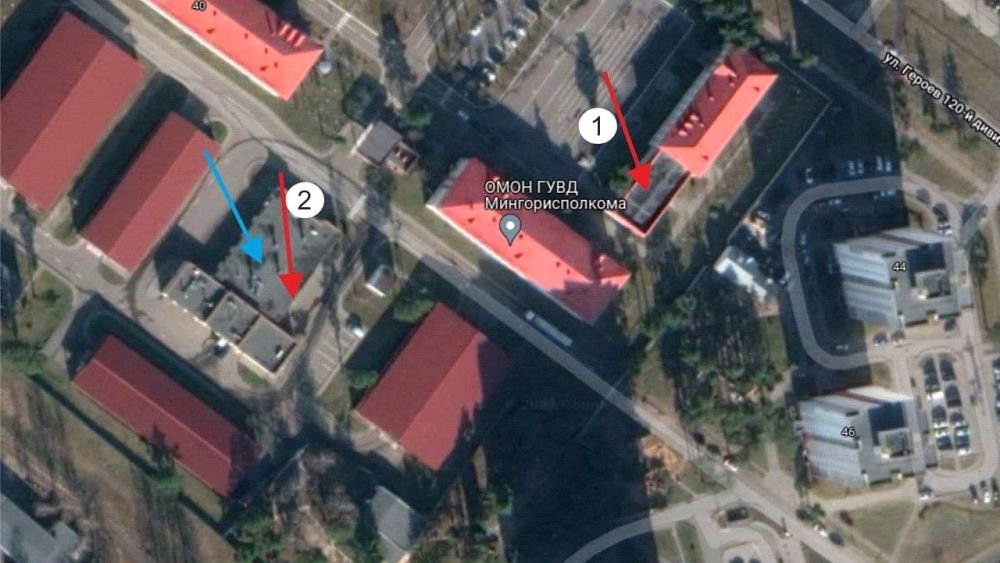
Belarusian cyber-activists claim to have targeted a riot police building in northeastern Minsk in a first-of-its-kind drone attack last month.
Busly Latsyats (Flying Storks) was formed on November 13 last year amid an ongoing crackdown on dissent over Belarus’ disputed presidential election. Long time leader Alexander Lukashenko, dubbed Europe’s last dictator, was declared the victor with an 80% vote share. His critics said the election was rigged in his favour.
On September 25 this year, the group said it had used a drone to drop 10 litres of “an incendiary mixture” on a base run by OMON: a Belarusian law enforcement force under the control of the Ministry of Interior.
Footage of the incident showed loud bangs and flashes emanating from part of the compound. The building is located in 120th Division Heroes Street, in Minsk’s Uruch’ye district: an area where many OMON officers and their families are known to reside.
A spokesperson for Busly Latsyats told Euronews they couldn’t reveal the extent of the damage or if anyone was injured.
But they stressed they only used “non-violent” methods, adding: “We prefer not to hypothesise about future plans and let everyone use their imagination.”
Targeted attacks on Belarusian state infrastructure
Almost a year since its inception, Busly Latsyats is now a hundreds-strong network comprising Belarusian activists of different professional backgrounds.
It is one of three members of a wider umbrella organization, Suprativ, which was formed on September 18, 2020, to combat the Lukashenko administration in cyberspace.
The alliance does not recognise Lukashenko as the legitimate ruler of Belarus and aims to use digital means to overthrow the government and aid the country in a “stable return to democratic principles and the rule of law”.
In July this year another Suprativ founding member, the Belarusian Cyber-Partisans, said it had hacked into the Ministry of Interior’s computer system.
The group said it had obtained more than five terabytes of data including Belarusian security agents’ real identities and addresses.
In mid-September, Busly Latsyats claimed responsibility for the sabotage of police cars in Minsk by pinching the brake cables and was involved in the fire-bombing of a police shooting range outside the city later in the month.
“Since November,” the spokesperson said, “we raised the level of impact with each of our operations. We only use non-violent methods and all are proving to be successful.
“We have and are working on different types of physical impact operations. We focus on the private property of collaborators, regime infrastructure, railroad infrastructure, and so on.”
Suprativ has published a detailed list of all the alliance’s reported operations so far. They run from the tongue-in-cheek – adding Lukashenko to the Ministry’s own most-wanted list, for instance – to the deadly serious, including the recent drone attack.
Why OMON?
Since demonstrations broke out in Belarus in August 2020, OMON has been instrumental in forcibly breaking up and detaining protesters.
As early as August 10 last year, Amnesty International accused riot police of unleashing “appalling violence” on Belarusian civilians.
Human Rights Watch and the UN Human Rights Commission have also sounded the alarm over the systematic use of excessive force, torture and arbitrary detention of thousands of peaceful protesters in Belarus since last summer.
“OMON is notorious as a main punitive tool of the dictator,” the Busly Latsyats representative said. “It is mainly used to suppress political opponents of the regime using terrorist methods.
“According to our strategy, we work to weaken the regime’s major tools of suppression – special “political” police forces and KGB. These forces are used to terrorise people who disagree with the regime.
“The drone attack operation was performed with a method the dictator is not able to defend his forces from. It was one more signal for ‘political’ police forces from Suprativ to show that people didn’t come to terms with the dictator and his collaborators’ repression.”
The group also noted that aerial defence systems failed to prevent them from carrying out a drone attack on a base in the Belarusian capital.
“We haven’t been surprised by the regime’s mistakes and inefficiency,” the spokesperson said. “The regime that prefers loyalty over professionalism is destined to make mistakes and that’s what we see in Belarus.
“And we use these opportunities to defend ourselves and fight against the oppression and brutality of the dictatorial regime.”
The Ministry of Interior did not respond to a request for comment.
